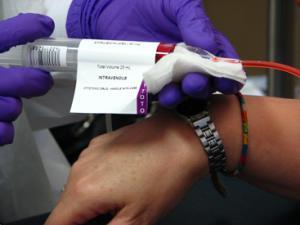In the hematology sequence, students learn to recognize and diagnose anemias, bleeding and clotting disorders, and abnormal white blood cell and lymphocyte disorders. Students learn the clinical approach to a patient with a red blood cell, hemostatic or thrombotic, and white blood cell disorder.
Sequence Directors:
Paula Bockenstedt, M.D.
Lloyd Stoolman, M.D
dScribe: Cathy Mummert
Syllabus
Educational Objectives
The following are the educational objectives of the Hematology Sequence.
I. Management of a Presenting Problem
Given a real or simulated patient with one of the following presenting problems, the student will be able to list the steps to be taken in appropriate sequence to determine the diagnosis:
Anemia—macrocytic, normocytic, or microcytic - Leukocytosis
Bleeding (including petechiae and purpura) - Leukopenia
Lymphadenopathy - Thrombocytopenia
II. Diagnosis of a Specific Disease
Given a real or simulated patient with one of the following diagnoses, the student will be able to gather the appropriate data, arrive at a diagnosis, and give the evidence (historical, physical, laboratory, radiologic, and special procedural data) to support the diagnosis:
Iron deficiency anemia - Hemolytic disease of the newborn
Anemia due to Vit B12 deficiency - Lymphoma (any type)
Anemia due to folic acid deficiency - Chronic lymphocytic leukemia
Thalassemia, Sickle cell Disease - Chronic myelocytic leukemia
Hereditary spherocytosis - Acute leukemia
Hemolytic Anemias - Multiple Myeloma
Thrombosis - Hemophilia A and B and von Willebrands disease
Platelet Receptors - Disseminated Intravascular Coagulation
III. Therapy of Patients
Given a real or simulated patient with one of the following diagnoses, the student will be able to describe the etiologic and/or pathophysiologic process present in the patient, how these relate to abnormal findings, and outline the principles of the therapeutic program:
Iron deficiency anemia - G-6-PD deficiency
Anemia due to Vit B12 deficiency - Hereditary spherocytosis
Anemia due to folic acid deficiency - Lymphoma/Hodgkin’s Disease
Venous Thrombosis - Immune thrombocytopenia
Disseminated Intravascular Coagulation
IV. Procedural/Interpretive Skills
A. The student will be able to list the indications for:
Bone marrow aspiration and/or biopsy. Lymph node biopsy.
B. The student will be able to examine a peripheral blood smear to:
- Identify polymorphonuclear neutrophils, mature mononuclear cells (lymphocytes and monocytes), and granulocyte precursors as a group (not individual stages).
- Perform a WBC differential composed of cells in the line above sufficiently accurately to extract the clinical information relevant to the patient being examined.
- Estimate platelets being able to recognize moderate to extreme thrombocytopenia, normal platelet status, and moderate to extreme thrombocytosis.
- Accurately describe the RBC morphology of any condition using standard nomenclature.
V. Enabling Objectives
The student shall be able to:
- Describe the general origin, function, and component parts of the hematopoietic system.
- Describe the basic kinetics of red cell, white cell, and platelet formation and life span.
- Be able to classify red blood cell disorders based upon the size of the red blood cells.
- List the indications for, hazards of, and methods of whole blood, packed red cell, platelet, and plasma component transfusions.
- Provide a diagnostic approach to the bleeding patient by completely knowing the differential diagnosis of a long APTT, PT, both APTT and PT, and bleeding time.
- List the indications for and be able to interpret the following tests: serum iron and iron binding capacity, ferritin level, reticulocyte count, Schilling test, Coombs' test, stool guaiac, platelet count, prothrombin time, activated partial thromboplastin time, thrombin clotting time, and bleeding time.
- Describe the mode of action of standard heparin, low molecular weight heparin, warfarin (Coumadin™), platelet glycoprotein IIb/IIIa antongists, and clopidogrel (PlavixTM).
- Be able to provide a differential diagnosis of clinical, protein, and molecular defects associated with thrombosis.
Attendance Requirements
- All students must review the Powerpoint Presentation “Laboratory Evaluation of the Peripheral Blood Smear”.
- All students must attend their assigned Small Group Sessions.
- All students must attend the final two lectures of the Heme Sequence called MDC I and II on Autologous Bone Marrow Trasnplantation and Allo Bone Marrow Transplantation.
- All students must attend the Hematopathology Labs I and II the second week of the course (see Dr. Stoolman for details).
Dr. Bockenstedt will discuss remediation for required events at the start of the course.
Grading Criteria
The Hematology sequence grade will be based on the final examination that will include a laboratory component. The final examination of about 100 questions will be open at 5 PM on Friday January 16, 2009. Each question on the final exam (80-90) will be worth one to five points. The remaining 10 points will come from the laboratory practical exam, which will also be administered beginning 5 PM on Friday, January 16, 2009 through 11:59 PM Monday, January 19, 2009.
Medical School criteria will be used to assign grades. Grading will comply with M2 grading policies. A pass/fail system will be used, and a cumulative grade of 75% or higher will be required for a passing score. Cumulative grades of 74.99% or lower will be assigned a failing grade. Make-up examinations for failures is a combination multiple choice and essay examination.
Jump to:
| Document Title | Creator | Downloads | License |
|---|---|---|---|
|
01.03.11: Hematopoieses |
Ivan Maillard
|
||
|
01.07.09(a): Introduction to Radiation Oncology, Pre-Clinical |
Theodore Lawrence
|
||
|
01.07.09(b): Introduction to Radiation Oncology, Clinical |
Theodore Lawrence
|
||
|
01.08.09: Acquired Bleeding Disorders |
Steven Pipe
|
||
|
01.09.09(a): Blood Banking Theory and Component Therapy |
Robertson Davenport
|
||
|
01.09.09(b): Complications of Transfusion |
Robertson Davenport
|
||
|
01.12.09: Myeloid Cell Disorders |
John Levine
|
||
|
01.13.09: Chronic Myeloid Leukemia and other Myeloproliferative Neoplasms (MPNs) |
Dale Bixby
|
| Document Title | Creator | Downloads | License |
|---|---|---|---|
|
2007 Daily Schedule: M2 Hematology / Oncology |
Dept. Staff
|
||
|
2008 Daily Schedule: M2 Hematology / Oncology |
Dept. Staff
|
||
|
2009 Daily Schedule: M2 Hematology / Oncology |
Dept. Staff
|
||
|
2010 Daily Schedule: M2 Hematology / Oncology |
Dept. Staff
|
| Document Title | Creator | Downloads | License |
|---|---|---|---|
|
01.05.09(a): Hematopoiesis |
Aken Desai
Michael Mathis
|
||
|
01.05.09(b): Red Blood Cells |
Aken Desai
Michael Mathis
|
||
|
01.05.09(c): Anemia |
Aken Desai
Michael Mathis
|
||
|
01.05.09(d): Nutritional Anemias |
Aken Desai
Michael Mathis
|
||
|
01.05.09(e): Congenital Hemolytic Anemias |
Aken Desai
Michael Mathis
|
||
|
01.05.09(f): Peripheral Blood Smear Self-Review |
Aken Desai
Michael Mathis
|
||
|
01.05.09(g): Coagulation Self-Review |
Aken Desai
Michael Mathis
|
||
|
01.06.09(a): Acquired Hemolytic Anemias |
Aken Desai
Michael Mathis
|
||
|
01.07.09(a): Hemostasis |
Aken Desai
Michael Mathis
|
||
|
01.07.09(b): Bleeding Disorders |
Aken Desai
Michael Mathis
|
||
|
01.07.09(c): Congenital Coagulation Factor Deficiencies |
Aken Desai
Michael Mathis
|
||
|
01.07.09(d): Introduction to Radiation Oncology |
Aken Desai
Michael Mathis
|
||
|
01.08.09(a): Acquired Bleeding Disorders |
Aken Desai
Michael Mathis
|
||
|
01.08.09(b): Platelet Disorders |
Aken Desai
Michael Mathis
|
||
|
01.08.09(c): Thrombosis |
Aken Desai
Michael Mathis
|
||
|
01.08.09(d): Anticoagulants and Antiplatelet Drugs |
Aken Desai
Michael Mathis
|
||
|
01.09.09(a): Blood Banking and Component Therapy |
Aken Desai
Michael Mathis
|
||
|
01.09.09(b): Pediatric Hematology |
Aken Desai
Michael Mathis
|
||
|
01.09.09(c): Blood Transfusion Complications |
Aken Desai
Michael Mathis
|
||
|
01.12.09(a): Myeloid Cell Disorders |
Aken Desai
Michael Mathis
|
||
|
01.12.09(b): Leukocytes and Malignancies |
Aken Desai
Michael Mathis
|
||
|
01.12.09(c): Bone Marrow Stem Cell Disorder Pathology |
Aken Desai
Michael Mathis
|
||
|
01.13.09(a): Aplastic Anemia and Myelodysplastic Syndromes |
Aken Desai
Michael Mathis
|
||
|
01.13.09(b): Chronic Myeloid Leukemia and Myeloproliferative Disorders |
Aken Desai
Michael Mathis
|
||
|
01.13.09(c): Acute Leukemia |
Aken Desai
Michael Mathis
|
||
|
01.14.09(a): Lymphoma Pathology |
Aken Desai
Michael Mathis
|
||
|
01.14.09(b): Lymphoma |
Aken Desai
Michael Mathis
|
||
|
01.14.09(c): Multiple Myeloma and other Plasma Cell Disorders |
Aken Desai
Michael Mathis
|
||
|
01.15.09(a): Cancer Pharmacology |
Aken Desai
Michael Mathis
|
||
|
01.16.09(a): Blood and Marrow Stem Cell Transplantation |
Aken Desai
Michael Mathis
|




